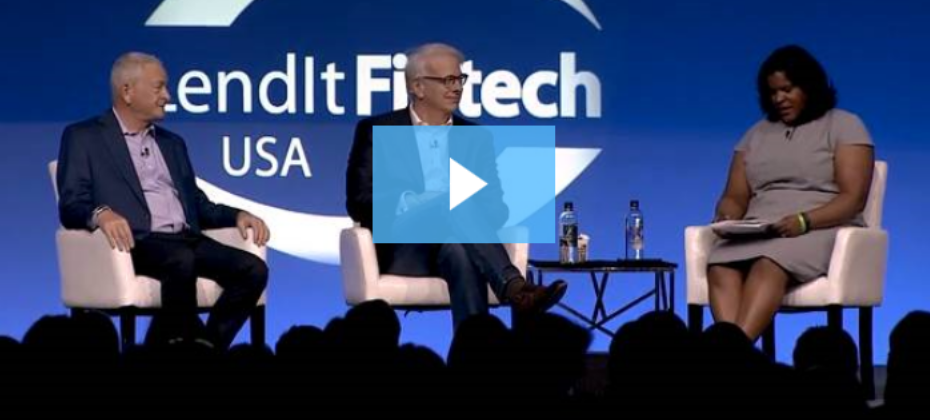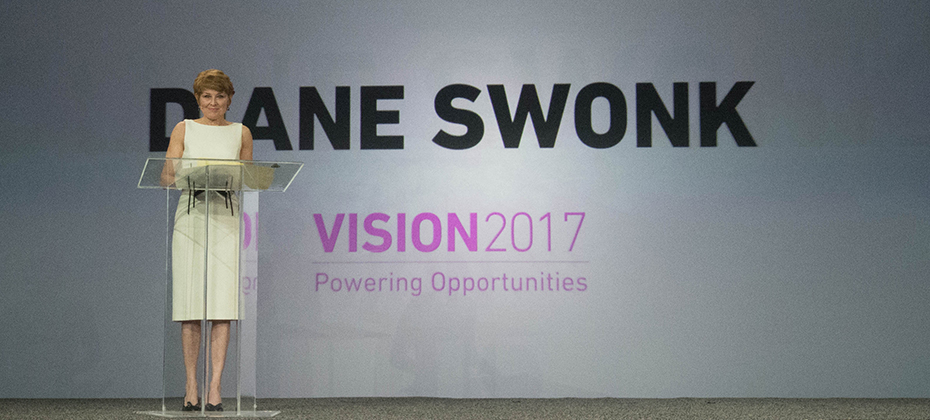Tag: fintech

Today is National Fintech Day – a day that recognizes the ever-important role that fintech companies play in revolutionizing the customer experience and altering the financial services landscape. Fintech. The word itself has become synonymous with constant innovation, agile technology structures and being on the cusp of the future of finance. Fintech challengers are disrupting existing financial models by leveraging data, advanced analytics and technology – both inspiring traditional financial institutions in their digital transformation strategies and giving consumers access to a variety of innovative financial products and services. But to us at Experian, National Fintech Day means more than just financial disruption. National Fintech Day represents the partnerships we have carefully fostered with our fintech clients to drive financial inclusion for millions of people around the globe and provide consumers with greater control and more opportunities to access the quality credit they deserve. “We are actively seeking out unresolved problems and creating products and technologies that will help transform the way businesses operate and consumers thrive in our society. But we know we can’t do it alone,” said Experian North American CEO, Craig Boundy in a recent blog article on Experian’s fintech partnerships. “That’s why over the last year, we have built out an entire team of account executives and other support staff that are fully dedicated to developing and supporting partnerships with leading fintech companies. We’ve made significant strides that will help us pave the way for the next generation of lending while improving the financial health of people around the world.” At Experian, we understand the challenges fintechs face – and our real-world solutions help fintech clients stay ahead of constantly changing market conditions and demands. “Experian’s pace of innovation is very impressive – we are helping both lenders and consumers by delivering technological solutions that make the lending ecosystem more efficient,” said Experian Senior Account Executive Warren Linde. “Financial technology is arguably the most important type of tech out there, it is an honor to be a part of Experian’s fintech team and help to create a better tomorrow.” If you’d like to learn more about Experian’s fintech solutions, visit us at Experian.com/Fintech.

Earlier this month, Experian joined FinovateSpring in San Francisco, CA to demonstrate innovations impacting financial health to over 1,000 attendees. The Finovate conference promotes real-world solutions while highlighting short-form demos and key insights from thought-leaders on digital lending, banking, payments, artificial intelligence and the customer experience. With more than 100 million Americans lacking fair access to credit, it's more important than ever for companies to work to improve the financial health of consumers. In addition to the show's abundance of fintech-centered content, Experian hosted an exclusive, cutting-edge breakout series demonstrating innovations that are positively impacting the financial health of consumers across the nation. Finovate Day One Overview While fintechs, banks, venture capitalist, entrepreneurs and industry analysts ascended on the general conference floor for a fast-paced day of demos, a select subset gathered for a luncheon presented by Experian North America CEO, Craig Boundy, and Group President, Alex Lintner. Attendees were given an in-depth look at new, alternative credit data streams and tools that are helping to increase financial access. Demos included: Experian Boost™: a free, groundbreaking online platform that allows consumers to instantly boost their credit scores by adding telecommunications and utility bill payments to their credit file. More than half a million consumers have leveraged Experian Boost, increasing their score by an average of 13 points. Cumulatively, Experian Boost has helped add more than 2.8 million points to consumers’ credit scores. Ascend Analytical Sandbox™: A first-of-its-kind data and analytics platform that gives companies instant access to more than 17 years of depersonalized credit data on more than 220 million U.S. consumers. It has been the most successful product launch in Experian’s history and recently earned the title of “Best Overall Analytics Platform” at this year’s Fintech Breakthrough Awards. Alternative Credit Data: Comprised of data from alternative credit sources, this data helps lenders make smarter and more informed lending decisions. Additionally, Experian’s Clear Data Platform is next-level credit data that adds supplemental FCRA-compliant credit data to enrich decisions across the entire credit spectrum. This new platform features alternative credit data, rental data, public records, consumer-permissioned data and more Upon conclusion of the luncheon, Alpa Lally, Experian’s Vice President of Data Business at Consumer Information Services, was interviewed for the HousingWire Podcast with Jacob Gaffney, HousingWire Editor in Chief, to discuss how new forms of data streams are helping improve consumers’ access to credit by giving lenders a clearer picture of their creditworthiness and risk. “Alternative credit data is different than traditional credit data and helps us paint a fuller picture of the consumer in terms of their ability to pay, willingness to pay and stability. It helps consumers get better access overall to the credit they deserve so that they can actively participate in the economy,” said Lally. Finovate Day Two Overview On the last day of the conference, expert speakers took to the main stage to analyze the latest fintech trends, opportunities and challenges. Alex Lintner and Sandeep Bhandari, Chief Strategy Officer and Chief Risk Officer at Affirm, participated in a fireside chat titled “Improving the Financial Health of America’s 100 Million Credit Underserved Consumers.” Moderated by David Penn, Finovate Analyst, the session explored the latest innovations, trends and technologies – from machine learning to alternative data – that are making a difference in positively impacting the financial health of Americans and expanding financial opportunities for underserved consumers. The panel discussed the efforts made to put financial health at the center of their business and the impact it’s had on their organizations. Following the fireside chat, Experian hosted a second lunch briefing, presented by Vijay Mehta, Chief Innovation Officer, and Greg Wright, EVP Chief Product Officer. The lunch included exclusive table discussions and open conversations to help attendees leave with a better understanding of the importance of prioritizing financial health to build trust, reach new customers and ultimately grow their business. "We are actively seeking out unresolved problems and creating products and technologies that will help transform the way businesses operate and consumers thrive in our society. But we know we can't do it alone," Experian North American CEO, Craig Boundy said in a recent blog post on Experian's fintech partnerships and Finovate participation. "That's why over the last year, we have built out an entire time of account executives and other support staff that are fully dedicated to developing and supporting partnerships with leading fintech companies. We've made significant strides that will help us pave the way for the next generation of lending while improving the financial health of more people around the world." For more information on how Experian is partnering with fintechs, visit experian.com/fintech or read our recent blog article on consumer-permissioned data for an in-depth discussion on Experian BoostTM.

Earlier this month, Experian joined the nation’s largest community of online lenders at LendIt Fintech USA 2019 in San Francisco, CA to show over 5,000 attendees from 50 countries the ways consumer-permissioned data is changing the credit landscape. Experian Consumer Information Services Group President, Alex Lintner, and FICO Chief Executive Officer, Will Lansing, delivered a joint keynote on the topic of innovation around financial inclusion and credit access. The keynote addressed the analytical developments behind consumer-permissioned data and how it can be leveraged to responsibly and securely extend credit to more consumers. The session was moderated by personal finance expert, Lynnette Khalfani-Cox, from The Money Coach. “Consumer-permissioned data is not a new concept,” said Lintner. “All of us are on Facebook, Twitter, and LinkedIn. The information on these platforms is given by consumers. The way we are using consumer-permissioned data extends that concept to credit services.” During the keynote, both speakers highlighted recent company credit innovations. Lansing talked about UltraFICO™, a score that adds bank transaction data with consumer consent to recalibrate an existing FICO® Score, and Lintner discussed the newly launched Experian Boost™, a free, groundbreaking online platform that allows consumers to instantly boost their credit scores by adding telecommunications and utility bill payments to their credit file. “If a consumer feels that the information on their credit files is not complete and that they are not represented holistically as an applicant for a loan, then they can contribute their own data by giving access to tradelines, such as utility and cell phone payments,” explained Lintner. There are approximately 100 million people in America who do not have access to fair credit, because they are subprime, have thin credit files, or have no lending history. Subprime consumers will spend an additional $200,000 over their lifetime on the average loan portfolio. Credit innovations, such as Experian Boost and UltraFICO not only give consumers greater control and access to quality credit, but also expand the population that lenders can responsibly serve while providing a differentiated and competitive advantage. “Every day, our data is used in one million credit decisions; 350 million per year,” said Lintner. “When our data is being used, it represents the consumers’ credit reputation. It needs to be accurate, it needs to be timely and it needs to be complete.” Following the keynote, Experian, FICO, Finicity and Deserve joined forces in a breakout panel to dive deeper into the concept of consumer-permissioned data. Panel speakers included Greg Wright, Chief Product Officer at Experian’s Consumer Information Services; Dave Shellenberger, Vice President of Product Management at FICO; Nick Thomas, Co-Founder, President and Chief Technology Officer at Finicity, and Kalpesh Kapadia, Chief Executive Officer at Deserve. “As Alex described in today’s keynote, consumer-permissioned data is not a new concept,” said Greg Wright. “The difference here is that Experian, FICO and Finicity are applying this concept to credit services, working together to bring consumer-permissioned data to mass scale, so that lenders can reach more people while taking on less risk.” For an inside look at Experian and FICO’s joint keynote, watch the video below, or visit Experian.com and boost your own credit score.

At Experian, we know that fintechs don’t just need big data – they need the best data, and they need that data as quickly as possible. Successfully delivering on this need is one of the many reasons we’re proud to be selected as a Fintech Breakthrough Award winner for the second consecutive year. The Fintech Breakthrough Awards is the premier awards program founded to recognize fintech innovators, leaders and visionaries from around the world. The 2019 Fintech Breakthrough Award program received more than 3,500 nominations from across the globe. Last year, Experian took home the Consumer Lending Innovation Award for our Text for Credit Solution – a powerful tool for providing consumers the convenience to securely bypass the standard-length ‘pen & paper’ or keystroke intensive credit application process while helping lenders make smart, fraud protected lending decisions. This year, we are excited to announce that Experian’s Ascend Analytical Sandbox™ has been selected as winner in the Best Overall Analytics Platform category. “We are thrilled to be recognized by Fintech Breakthrough for the second year in a row and that our Ascend Analytical Sandbox has been recognized as the best overall analytics platform in 2019,” said Vijay Mehta, Experian’s Chief Innovation Officer. “We understand the challenges fintechs face - to stay ahead of constantly changing market conditions and customer demands,” said Mehta. “The Ascend Analytical Sandbox is the answer, giving financial institutions the fastest access to the freshest data so they can leverage the most out of their analytics and engage their customers with the best decisions.” Debuting in 2018, Experian’s Ascend Analytical Sandbox is a first-to-market analytics environment that moved companies beyond just business intelligence and data visualization to data insights and answers they could actually use. In addition to thousands of scores and attributes, the Ascend Analytical Sandbox offers users industry-standard analytics and data visualization tools like SAS, R Studio, Python, Hue and Tableau, all backed by a network of industry and support experts to drive the most answers and value out of their data and analytics. Less than a year post-launch, the groundbreaking solution is being used by 15 of the top financial institutions globally. Early Access Program Experian is committed to developing leading-edge solutions to power fintechs, knowing they are some of the best innovators in the marketplace. Fintechs are changing the industry, empowering consumers and driving customer engagement like never before. To connect fintechs with the competitive edge, Experian launched an Early Access Program, which fast-tracks onboarding to an exclusive market test of the Ascend Analytical Sandbox. In less than 10 days, our fintech partners can leverage the power, breadth and depth of Experian’s data, attributes and models. With endless use cases and easy delivery of portfolio monitoring, benchmarking, wallet share analysis, model development, and market entry, the Ascend Analytical Sandbox gives fintechs the fastest access to the freshest data so they can leverage the most out of their analytics and engage their customers with the best decisions. A Game Changer for the Industry In a recent IDC customer spotlight, OneMain Financial reported the Ascend Analytical Sandbox had helped them reduce their archive process from a few months to 1-2 weeks, a nearly 75% time savings. “Imagine having the ability to have access to every single tradeline for every single person in the United States for the past almost 20 years and have your own tradelines be identified among them. Imagine what that can do,” said OneMain Financial’s senior managing director and head of model development. For more information, download the Ascend Analytical Sandbox™ Early Access Program product sheet here, or visit Experian.com/Sandbox.

The lending market has seen a significant shift from traditional financial institutions to fintech companies providing alternative business lending. Fintech companies are changing the brick-and-mortar landscape of lending by utilizing data and technology. Here are four ways fintech has changed the lending process and how traditional financial institutions and lenders can keep up: 1. They introduced alternative lending models In a traditional lending model, lenders accept deposits from customers to extend loan offers to other customers. One way that fintech companies disrupted the lending process is by introducing peer-to-peer lending. With peer-to-peer lending, there is no need to take a deposit at all. Instead, individuals can earn interest by lending to others. Banks who collaborate with peer-to-peer lenders can improve their credit appraisal models, enhance their online lending strategy, and offer new products at a lower cost to their customers. 2. They offer fast approvals and funding In certain situations, it can take banks and credit card providers weeks to months to process and approve a loan. Conversely, fintech lenders typically approve and fund loans in less than 24 hours. According to Mintel, only 30% of consumers find various banking features easy-to-use. Financial experts at Toptal suggest that banks consider speeding up the loan application and funding process within their online lending platforms to keep up with high-tech companies, such as Amazon, that offer customers an overall faster lending process from applications to approval, to payments. 3. They're making use of data Typically, fintech lenders pull data from several different alternative sources to quickly determine how likely a borrow is to pay back the loan. The data is collected and analyzed within seconds to create a snapshot of the consumer's creditworthiness and risk. The information can include utility, rent. auto payments, among other sources. To keep up, financial institutions have begun to implement alternative credit data to get a more comprehensive picture of a consumer, instead of relying solely upon the traditional credit score. 4. They offer perks and savings By enacting smoother automated processes, fintech lenders can save money on overhead costs, such as personnel, rent, and administrative expenses. These savings can then be passed onto the customer in the form of competitive interest rates. While traditional financial institutions generally have low overall interest rates, the current high demand for loans could help push their rates even lower. Additionally, financial institutions have started to offer more customer perks. For example, Goldman Sachs recently created an online lending platform, called Marcus, that offers unsecured consumer loans with no fees. Financial institutions may feel stuck in legacy systems and unable to accomplish the agile environments and instant-gratification that today's consumers expect. However, by leveraging new data sets and innovation, financial institutions may be able to improve their product offerings and service more customers. Looking to take the next step? We can help. Learn More About Banks Learn More About Fintechs

While it’s a word that has only recently made its way into financial circles, consumers and businesses alike have been enjoying life in a platform world. Digital platforms connect riders with drivers, friends with family, manufacturers with buyers and sellers, and the list goes on. Digital platforms are technology-enabled business models that work to enhance efficiency, flexibility, scalability, integration, and ultimately user engagement. They’re integral to the operation and success of some of the most valuable companies in the world, including Google, Facebook, and Amazon. While digital platforms have made their way beyond high-tech to other industries, like supply chain management and logistics, financial institutions have fallen behind. The reasons why are understandable: a quickly evolving marketplace, regulatory induced risk aversion, and the need to protect data and privacy. Most of the digital platform adoption that has occurred in the financial industry has revolved around open banking, with a focus on enriching the customer experience. BBVA, for instance, recently launched a platform to enable their business clients to use white-labeled versions of BBVA products and services on-demand. But the value of digital platforms for the financial industry can go beyond how the consumer interfaces with his or her bank or credit union. Financial institutions could see the same efficiency, flexibility, and integration benefits by implementing technology platforms into their internal systems. Traditionally, financial institutions have used contrasting technology and systems across their customers’ lifecycle. From financial marketing and targeting, to acquisition and underwriting, there is ample opportunity to streamline and integrate these systems by adopting a platform architecture. The most future-forward platforms not only enable financial institutions to integrate their internal systems, but they also allow companies to seamlessly integrate their customer data with third-party data resources. The powers of data-driven answers combined with platform technology can help overcome business challenges and satisfy consumer and client demands. Is it time you and your company stepped up to the platform?

Although half of businesses globally report an increase in fraud management over the past 12 months, many still experience fraud losses and attacks. To help address these challenges, Experian held its first-ever Fintech Fraud & Identity Meetup on February 5 in San Francisco, Calif. The half-day event was aimed at offering insights on the main business drivers of fraud, market trends, challenges and technology advancements that impact identity management and fraud risk strategy operations. “We understand the digital landscape is changing – inevitably, with technology enhancements come increased fraud risk for businesses operating in the online space,” said Jon Bailey, Experian’s Vice President of Fintech. “Our focus today is on fraud and identity, and providing our fintech customers with the tools and insights needed to grow and thrive.” The meetup was attended by number of large fintech companies with services spanning across a broad spectrum of fintech offerings. To kick off the event, Tony Hadley, Experian’s Senior Vice President of Government & Regulatory Affairs, provided an update on the latest regulatory news and trends impacting data and the fintech space. Next followed a fraud and identity expert panel, which engaged seasoned professionals in an in-depth discussion around two main themes 1) fraud trends and risk mitigation; and 2) customer experience, convenience, and trust. Expert panelists included: David Britton, Experian’s Vice President of Industry Solutions; Travis Jarae, One World Identity’s Founder & CEO; George Kurtyka, Joust’s Co-Founder & COO; and Filip Verley, Airbnb’s Product Manager. “The pace of fraud is so fast, by the time companies implement solutions, the shelf-life may already be old,” Britton said. “That is the crux – how to stay ahead. The goal is to future-proof your fraud strategy and capabilities.” At the close of the expert panel, Kathleen Peters, Experian’s Senior Vice President Head of Fraud and Identity, demoed Experian’s CrossCore™ solution – the first smart, open, plug-and-play platform for fraud and identity services. Peters began by stating, “Fraud is constant. Over 60% of businesses report an increase in fraud-related losses over the past year, with the US leading the greatest level of concern. The best way to mitigate risk is to create a layered approach; that’s why Experian invented CrossCore.” With the sophistication of fraudsters, it’s no surprise that many businesses are not confident with the effectiveness of their fraud strategy. Learn more about how you can stay one step ahead of fraudsters and position yourself for success in the ever-changing fraud landscape; download Experian’s 2019 Global Identity and Fraud Report here. For an inside look at Experian’s Fintech Fraud & Identity Meetup, watch our video below.

2018 was a whirlwind of a year – though it was not surprising when Google’s 2018 “most-searched” list showed Fornite GIFs ruled the internet, Black Panther was the most-Googled movie, and the Keto diet was trending (particularly in late December and early January, go figure). But, while Google’s most-searched terms of 2018 present pure pop-culture entertainment, they miss the mark on the trends we find most meaningful being principals of the financial services industry. What about the latest news in fintech? According to Business Insider, fintech companies secured $57.9 billion in funding in the first half of 2018 alone, nearing the previous annual record of $62.5 billion set in 2015. Taking it a step further, CBInsights reports that 24 of 39 fintech unicorns are based in North America. We won’t blame Google for this oversight. Faced with the harsh reality that the “most-searched” results are based on raw-data, perhaps it’s possible that people really do find Fortnite more exciting than financial services trends – but not us at Experian. We have been closely following disruption in the financial services space all while leading the charge in data innovation. When competing in environments where financial institutions vie for customer acquisition and brand loyalty, digital experience is not enough. Today’s world demands finance redefined – and fintechs have answered the call. Fintechs are, by far, among the most innovative technology and data-driven companies in the financial services industry. That’s why we built a team of seasoned consultants, veteran account executives and other support staff that are 100% dedicated to supporting our fintech partners. With our expert team and a data accuracy rate of 99.9%, there isn’t a more reliable fintech source. Perhaps this is one financial services trend that Google can’t ignore (we see you Google)! For more information regarding Experian’s fintech solutions, check out our video below and visit Experian.com/fintech.

How can fintech companies ensure they’re one step ahead of fraudsters? Kathleen Peters discusses how fintechs can prepare for success in fraud prevention.

Picking up where we left off, online fintech lenders face the same challenges as other financial institutions; however, they continue to push the speed of evolution and are early adopters across the board. Here’s a continuation of my conversation with Gavin Harding, Senior Business Consultant at Experian. (Be sure to read part 1.) Part two of a two-part series: As with many new innovations, fintechs are early adopters of alternative data. How are these firms using alt data and what are the results that are being achieved? In a competitive market, alternative data can be the key to helping fintechs lend deeper and better reach underserved consumers. By augmenting traditional credit data, a lender has access to greater insights on how a thin-file consumer will perform over time, and can then make a credit decision based on the identified risk. This is an important point. While alternative data often helps lenders expand their universe, it can also provide quantitative risk measures that traditional data doesn’t necessarily provide. For example, alternative data can recognize that a consumer who changes residences more than once every two years presents a higher credit risk. Another way fintechs are using alternative data is to screen for fraud. Fraudsters are digitally savvy and are using technology to initiate fraud attacks on a broader array of lenders, in bigger volumes than ever before. If I am a consumer who wants to get a loan through an online fintech lender, the first thing the lender wants to know is that I am who I say I am. The lender will ask me a series of questions and use traditional data to validate. Alternative data takes authentication a step further and allows lenders to not only identify what device I am using to complete the application, but whether the device is connected to my personal account records – giving them greater confidence in validating my identity. A second example of using alternative data to screen for fraud has to do with the way an application is actually completed. Most individuals who complete an online application will do so in a logical, sequential order. Fraudsters fall outside of these norms – and identifying these patterns can help lenders increase fraud detection. Lastly, alternative data can help fintech lenders with servicing and collections by way of utilizing behavioral analytics. If a consumer has a history of making payments on time, a lender may be apt to approve more credit, at better terms. As the consumer begins to pay back the credit advance, the lender can see the internal re-payment history and recommend incremental line increases. From your perspective, what is the future of data and what should fintechs consider as they evolve their products? The most sophisticated, most successful “think tanks” have two things that are evolving rapidly together: Data: Fintechs want all possible data, from a quality source, as close to real-time as possible. The industry has moved from “data sets” to “data lakes” to “data oceans,” and now to “data universes.” Analytics: Fintechs are creating ever-more sophisticated analytics and are incorporating machine learning and artificial intelligence into their strategies. Fintechs will continue to look for data assets that will help them reach the consumer. And to the degree that there is a return on the data investment, they will continue to capitalize on innovative solutions – such as alternative data. In the competitive financial marketplace, insight is everything. Aite Group recently conducted a new report about alternative data that dives into new qualitative research collected by the firm. Join us to hear Aite Group’s findings about fintechs, banks, and credit unions at their webinar on December 4. Register today! Register for the Webinar Click here for more information about Experian’s Alternative Data solutions. Don’t forget to check out part one of this series here. About Gavin Harding With more than 20 years in banking and finance Gavin leverages his expertise to develop sophisticated data and analytical solutions to problem solve and define strategies across the customer lifecycle for banking and fintech clients. For more than half of his career Gavin held senior leadership positions with a large regional bank, gaining experience in commercial and small business strategy, SBA lending, credit and risk management and sales. Gavin has guided organizations through strategic change initiatives and regulatory and supervisory oversight issues. Previously Gavin worked in the business leasing, agricultural and construction equipment sectors in sales and credit management roles.

There’s no shortage of buzz around fintechs shifting from marketplace challengers to industry collaborators. Regardless of fintech’s general reputation as market disruptors, a case can certainly be made for building partnerships with traditional financial institutions by leveraging the individual strengths of each organization. According to the World FinTech Report 2018, 75.5% of fintechs surveyed selected “collaborate with traditional firms” as their main objective. Whereas fintechs have agility, a singular focus on the customer, and an absence of legacy systems, traditional Financial Institutions have embedded infrastructure, scale, reach, and are well-versed with regulatory requirements. By partnering together, fintechs and other Financial Institutions can combine strengths to generate real business results and impact the customer experience. New stories are emerging – stories that illustrate positive outcomes beyond efforts exerted by one side alone. A recent report sponsored by Experian and conducted by the Filene Research Institute further explores the results of fintech and traditional FI partnerships by examining the experiences of six organizations: The outcomes of these relationships are sure to encourage more collaborative partnerships. And while leveraging each organization’s strength is a critical component, there’s much more to consider when developing a strategic approach. In the fast-moving, disruptive world of fintech, just what are the key elements to building a successful collaboration with traditional Financial Institutions? Click here to learn more. More Info on Marketplace Lending Read the Filene Report

Fintechs take on banks, technology, and finance as we know It. In the credit space, their reputation as a market disruptor precedes their definition. But now, as they infiltrate headlines and traditional finance as many know it – serving up consumer-centric, convenience-touting, access-for-all online marketplace lending – fintechs aren’t just becoming a mainstay within the financial spectrum’s vernacular. With their increasing foothold in the marketplace, they are here and they are gaining momentum. Since their initial entry to the marketplace in 2006, these technology-driven online platforms flaunt big data, actionable analytics and originations growing at exponential rates. Fintechs hang their hats on their ability to be the “anti-bank” of sorts. The brainchild of finance plus technology, their brands promise simple but powerful deliverables – all centered on innovation. And they market themselves as filling in the gaps commonly accepted as standard practices by traditional financial institutions. Think paperwork, less-than-instant turnaround times, a history of unwavering tradition, etc. Fintechs deliver a one-two punch, serving the marketplace as both lending companies and technology gurus – two pieces that financial institutions want and consumers crave. Now, as they grow more prominent within the marketplace, some are starting to pivot to test strategic partnerships and bring their strengths – technological infrastructure, speed and agility – to credit unions and other traditional financial institutions. According to the World FinTech Report 2018, 75.5% of fintechs surveyed want to collaborate with traditional financial services firms. The challenge, is that both fintechs and traditional financial institutions struggle with finding the right partners, efficiently working together and effectively scaling innovation. From competitors to collaborators, how can fintechs and traditional institutions strike a partnership balance? A recent report sponsored by Experian and conducted by the Filene Research Institute, explores this conundrum by examining the experiences of six financial institutions – some fintechs and some traditional FIs – as they seek to collaborate under the common goal of better serving customers. The results offer up key ingredients for fostering a successful collaboration between fintechs and traditional financial institutions – to generate real impact to the customer experience and the bottom-line. Rest assured, that in the fast-moving, disruptive world of fintech, effective partnerships such as these will continue to push boundaries and redefine the evolving financial services marketplace. Learn More About Online Marketplace Lending Download the Filene Report

Unsecured lending is increasing. And everyone wants in. Not only are the number of personal loans increasing, but the share of those loans originated by fintech companies is increasing. According to Experian statistics, in August 2015, 890 new trades were originated by fintechs (or 21% of all personal loans). Two years later, in August 2017, 1.1 million trades belonged to fintechs (making up 36% of trades). This increase is consistent over time even though the spread of average loan amount between traditional loans and fintech is tightening. While convenience and the ability to apply online are key, interest rates are the number one factor in choosing a lender. Although average interest rates for traditional loans have stabilized, fintech interest rates continue to shift higher – and yet, the upward momentum in fintech loan origination continues. So, who are the consumers taking these loans? A common misconception about fintechs is that their association with market disruption, innovation and technology means that they appeal vastly to the Millennial masses. But that’s not necessarily the case. Boomers represent the second largest group utilizing fintech Marketplace loans and, interestingly, Boomers’ average loan amount is higher than any other generational group – 85.9% higher, in fact, from their Millennial counterparts. The reality is the personal loan market is fast-paced and consumers across the generational spectrum appear eager to adopt convenience-based, technology-driven online lending methods – something to the tune of $35.7 million in trades. For more lending insights and statistics, download Experian’s Q2 2018 Personal Loans Infographic here. Learn More About Online Marketplace Lending Download Lending Insights

Big Data is no longer a new concept. Once thought to be an overhyped buzzword, it now underpins and drives billions in dollars of revenue across nearly every industry. But there are still companies who are not fully leveraging the value of their big data and that’s a big problem. In a recent study, Experian and Forrester surveyed nearly 600 business executives in charge of enterprise risk, analytics, customer data and fraud management. The results were surprising: while 78% of organizations said they have made recent investments in advanced analytics, like the proverbial strategic plan sitting in a binder on a shelf, only 29% felt they were successfully using these investments to combine data sources to gather more insights. Moreover, 40% of respondents said they still rely on instinct and subjectivity when making decisions. While gut feeling and industry experience should be a part of your decision-making process, without data and models to verify or challenge your assumptions, you’re taking a big risk with bigger operations budgets and revenue targets. Meanwhile, customer habits and demands are quickly evolving beyond a fundamental level. The proliferation of mobile and online environments are driving a paradigm shift to omnichannel banking in the financial sector and with it, an expectation for a customized but also digitized customer experience. Financial institutions have to be ready to respond to and anticipate these changes to not only gain new customers but also retain current customers. Moreover, you can bet that your competition is already thinking about how they can respond to this shift and better leverage their data and analytics for increased customer acquisition and engagement, share of wallet and overall reach. According to a recent Accenture study, 79% of enterprise executives agree that companies that fail to embrace big data will lose their competitive position and could face extinction. What are you doing to help solve the business problem around big data and stay competitive in your company?

In just a few short hours, Vision attendees immersed themselves into the depths of the economy, risk models, specialty finance data, credit invisibles, student loan data, online marketplace lending and more. The morning kicked off with one of the most respected and trusted macroeconomists in the U.S., Diane Swonk. With a rap sheet filled with advising central banks and multinational companies, Swonk treated a packed house to a look back on what has transpired in the U.S. economy since the Great Recession, as well as launching into current state and speculating on the months ahead. She described the past decade not as “lost, but rather lagging.” She went onto to say this past year was transitional, and while markets slowed slightly during the months leading up the U.S. presidential election, good things are happening: We’ve finally broken out of the 2% wage rut Recruiting on college campuses has picked up The labor force is growing Debt-to-income levels have returned to where they were prerecession and Investment is coming back. “I believe we’ll see growth over 2% this year,” said Swonk. Still, change is underway. She commented on how the way U.S. consumer spending is changing, and of course we’re seeing a restructuring in the retail space. While JC Penney announces store closings, you simultaneously see Amazon moving from “click to brick,” dabbling in the opening of some actual storefronts. Globally, she said the economy is the strongest it has been in eight years. She closed by noting there is a great deal of political change and unrest in the world today, but says, “Never underestimate our abilities when we tap our human capital.” -- More than 100 attendees filled a room to hear about the current trends and the future of online lending with featured guests from Oliver Wyman, Marlette Funding and Lending USA. While speakers commented on the “hiccup” in the space last year with some layoffs and mergers, volume has continued to double every year for the past several years with roughly $40 billion in cumulative originations today. Panelists discussed the use of alternative data to decision, channel bias, the importance of partnerships and how the market will see fewer and fewer players offering just one product specialty. “It is expensive to acquire customers, so you don’t just want to have one product to sell, but rather a range,” said Sharat Shankar of Lending USA. -- The numbers in the student lending universe are astounding. In a session focused on the U.S. student loan market, new Experian data reveals there is $1.49 billion in total student loan outstandings. In fact, total outstandings have grown 21% over the past four years, while the number of trades have only grown 4%. Costs are skyrocketing. The average balance per trade has grown 17% over the past four years. “We don’t ration education in this country,” said Joe DePaulo of College Ave. Student Loans. “We give everyone access to liquidity when it comes to federal student loans – and it’s not like that in other countries.” While DePaulo notes the access is great, offering many students the opportunity to obtain higher education, he says the problem is with disclosures. Guardians are often the individuals filling out the FAFSA, but the students inherit the loans. Students, he says, rarely understand how much their monthly payment will ultimately be after graduation. For every $10,000 in student loans, he says that will generally equate to a $100 monthly payment. -- Tomorrow, Vision attendees will be treated to more breakout sessions and a concluding keynote with legendary quarterback Tom Brady.